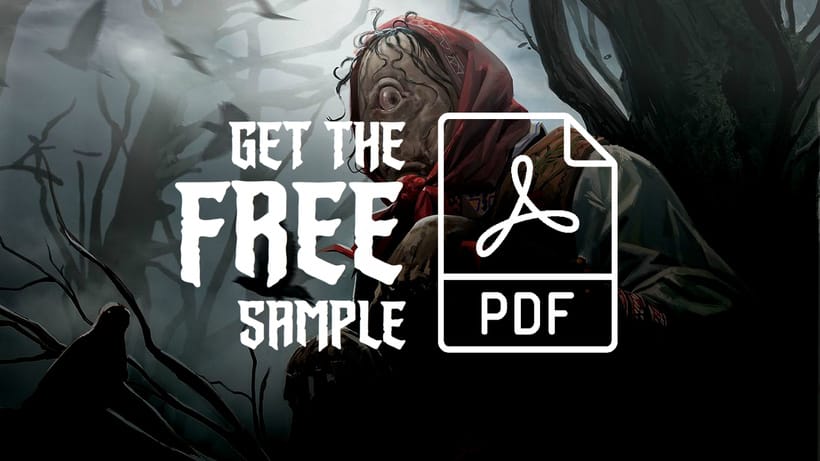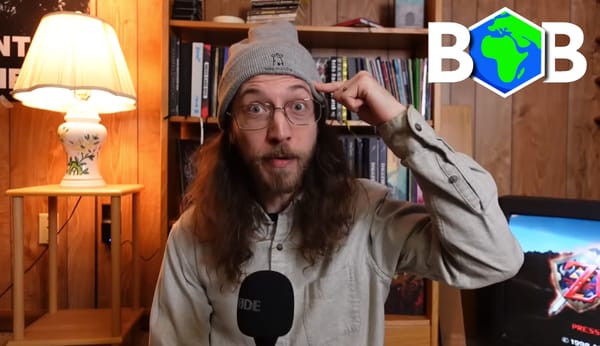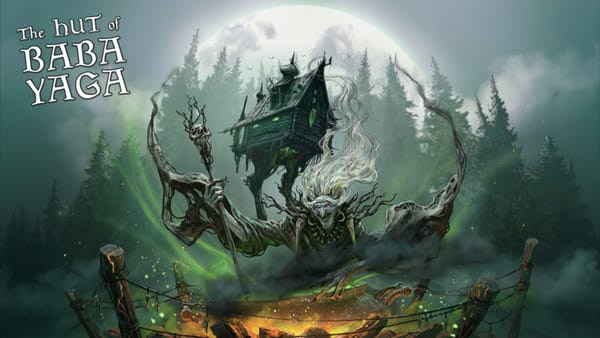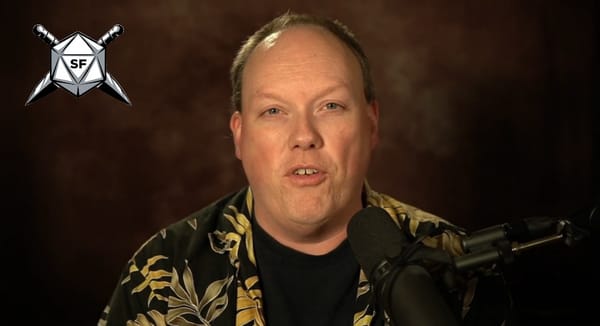Spaghetti Fantasy and Beyond – How Acheron Games is Redefining European RPGs
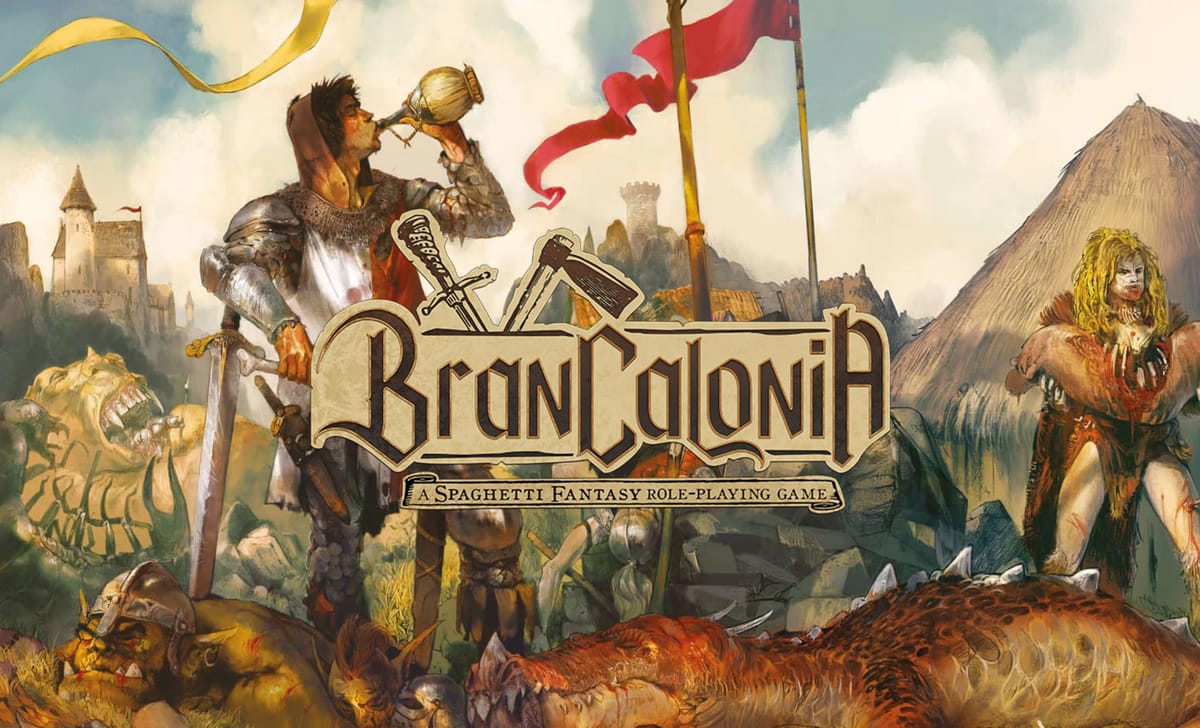
In a world dominated by Anglo-American and Japanese fantasy, Samuel Marolla set out to do something different. In 2020, right in the middle of the global lockdown, he launched Acheron Games—an Italian RPG publisher that quickly gained international acclaim with its breakout title Brancalonia, proudly billed as "The Spaghetti Fantasy RPG."
But Acheron is more than just another game studio—it's a cultural mission. From Inferno RPG, inspired by Dante’s Divine Comedy, to the alternate-history epic Lex Arcana, and the madcap, cartoonish chaos of Helluva Town, Acheron’s games are built on the idea of reviving overlooked myths, folklore, and artistic traditions from Italy—and beyond—and presenting them with bold creativity and modern flair.
In this wide-ranging conversation, Samuel opens up about Acheron’s chaotic-but-inspired creative process (“like a party where no one is really in control”), the guiding rule of “51% art, 49% commercial,” and the unique challenges of bridging European imagination with the expectations of the U.S. market.
He speaks candidly about the missteps of a challenging Kickstarter campaign, the importance of building tight-knit communities, and the deeply personal stories from fans who found joy in Acheron's games during difficult times.
This interview isn’t just a behind-the-scenes look at one of Europe’s most distinctive RPG studios—it’s a passionate reflection on culture, creativity, and the evolving role of tradition in a future shaped by technology and globalization.
Onwards!
Let's start from the beginnin – what inspired you to launch Acheron, and how did your first TTRPG project come to life?
Acheron was actually born in 2015 with the sole publication of speculative fiction in Italian and English (Acheron Books). Acheron Games (rpgs) was born in March 2020 in full lockdown with the title "Brancalonia - The Spaghetti Fantasy Rpg".
The idea behind Acheron is as simple as it is banal, so much so that we wondered why no one had done it before: to enhance the "fantasy made in Italy".
Now, all of us "nerds" grew up with the Anglophone and Japanese fantasy imagery, and we will forever be indebted to it.
But I have always been sorry that all cultures other than these two (including the Italian one) are not widespread, despite having an enormous heritage with huge unexpressed potential. Poland is an excellent example with the Geralt of Rivia saga.
This is how Acheron was born.
The name itself represents the intent to spread the Italian fantasy. Acheron is one of the rivers of Dante's Inferno (and even before that of Greco-Roman mythology) but it is also the Empire of Acheron of Robert E. Howard's Hyborian Age.
The name "Acheron" therefore wants to be a bridge between two imaginaries, the Anglophone one and the Italian one.
The problem is that when we started, no one, including us, had the slightest idea of what exactly Italian Fantasy was... ahah
Then over the years we "discovered" little by little what the stylistic features of our imagination are. But it took a lot of work! a bit like assembling and awakening Frankenstein's Creature.....
How do you decide which themes or historical periods to explore in your games, such as Dante's Inferno, Lex Arcana's Roman Empire, or Brancalonia's spaghetti-fantasy Italy?
We choose settings, stories or ideas that allow us to explore various aspects of the Italian fantasy. The roots are therefore literary, historical, folkloric, artistic and, why not, even pop culture. Everything starts from the concept. It has to convince us a lot, and excite us.
We never create and publish anything that doesn’t excite us like children. The creation process it’s like a party. Someone of the writing or game designer team propose something cool and we start to party hard inventing super silly things.
It's like a party where everyone is drunk and no one is seriously able to handle the situation.
What's your approach to blending history, mythology, and fantasy? Do you start with the mechanics, the setting, or a narrative vision?
After the hangover that follows choosing the next idea to develop, unfortunately it comes the real work. First, let's rationalize the monster we've created and decide whether it can actually be a commercial hit. In Acheron we have a rule, in case of indecision: the artistic aspect counts 51% and the commercial one 49%.
This means that they are two equally important decision centers. But, in the end, the artistic aspect wins. It is extremely difficult to remain balanced and economically sustainable producing "artistic products".
Because they are two very precise words: "product" and "art". A publishing house is a for-profit company. No doubt about it. But also a HUGE responsibility in the type of "art" produced. It is indeed a very complex balance, but also a fascinating one.
Then, there is the studying part. We deeply study the sources relating to that setting. The Biblical Apocalypse, the Middle Ages, folklore, a remote province of the Roman Empire... even a very pop setting like Helluva Town required months of study on vintage cartoons.
The game mechanics follow the world building and enhance it, but they are absolutely an integral part of it, just as the drawing follows and enhances the script of a comic. They complement each other, like in a marriage.
Many of your games have a very strong Italian identity. How important is cultural heritage in your creative process?
It’s everything. It’s our nature: we're the only publishers in the world to do so.
But now, after years, we are looking for ways that are consistent with our nature but at the same time allow us to range over more themes and be less repetitive. Helluva Town for example is based on an imaginary cartoon and crazy version of New York's Little Italy.
It's another way to use "Italianness" but without getting trapped by it. At the same time we would like to gradually broaden the scope to the various European cultures, which are also poorly valued.
What are the biggest differences between publishing TTRPG content in Italy and reaching international audiences, especially through Acheron America?
It depends a lot from country to country. Making a very general summary, the markets of continental Europe (so Italy included) are similar to each other on a cultural level and therefore also in terms of appreciation of a certain game or a certain world building.
So we are quite confident that if a game works in Italy, it will also work in other European countries.
But with English-speaking countries the situation is different, both for the UK and, above all, for the US. In the United States, where we are very present, we note that sometimes there are important cultural differences (and even barriers).
Talking about what we do in Acheron, we notice that American players are attracted to "exotic" RPGs if they recognize the basic idea well: for example Dante's Inferno, or the Roman Empire.
But if we go to more particular settings, such as Brancalonia, not having an imprint on the subject, sometimes they can be wary. I am obviously generalizing. Brancalonia is also very popular in the USA, but it takes more time and effort to overcome an initial barrier at times.
Conversely, Brancalonia's humor and its sources (slapstick comedy, Bud Spencer & Terence Hill, spaghetti westerns, etc.) are generally immediately understood and appreciated in Europe.
As for the Asian markets... it's a world yet to be discovered. Lex Arcana is published in Japan, and we are now starting to collaborate with China.
I'm very curious to discover that world.
Our "Marco Polo" has been a great "bridge".
You've run multiple successful crowdfunding campaigns. What lessons have you learned from managing these campaigns on Kickstarter?
Rpg crowdfunding is "curse and delight" (croce e delizia) as we say in Italy.
For us it was fundamental to make ourselves known abroad and it is still a very useful tool, not to say almost indispensable. Even if we have been working for some time to ensure that it is, as it should be, only ONE of the various sales streams.
But too many publishers have abused it and I can well understand how easy it is to let it slip.
The other day I was chatting with a fellow publisher and we were seeing how rpg crowdfunding for some fellow publishers can become almost a gambling addiction. Which is very, very dangerous. You risk miscalculating the results and then having to do more and more campaigns to finance past losses.
But in this period of complex macroeconomic situation, of possible crisis of the global ttprg sector, and of the bursting of the crowd "bubble", all this is even more dangerous.
As I said: curse and delight……..
How do you approach pre-campaign marketing and community building? What's your strategy to keep backers engaged during and after the campaign?
There are so many strategies and so many things to say, we could talk about it for hours. Today 2025 has changed a lot compared to the boom of the years 2020/2023. The secret of everything is the community. Few titles (actually, as Acheron Games we have too many!!!!) but supporting their communities with all possible energy.
The era of the great disposable "shooting stars" RPGs is over. The public is accustomed, the offer of RPGs is ENDLESS, the average player is full of manuals to play until 2099.
Only those who have the most faithful and affectionate communities will survive.
Has crowdfunding changed your long-term publishing plans or how you allocate resources between projects?
Yes, although as I said we have been working on a production method that is not "crowdfunding driven" for some time. At the moment, however, it still has a strong impact on our calendar. I believe we will reach a "detachment" equilibrium in 2027.
Which of your crowdfunding campaigns posed the biggest challenge, and what would you do differently today?
Ah! Great question!!
Apart from a couple of strange experiments (Enter Boogeyman, horror literature with Stephen King!, and Press Start, a series of gamebooks), probably Brancalonia 2 – The Empire Whacks Back.
We were coming off successes like Brancalonia 1 and Inferno, and perhaps we overestimated ourselves. Let's be clear, the campaign went well (160k). But we expected more, and we lost 1200 backers along the way.
In hindsight, I think the biggest mistake was to have proposed too quickly a narrative change of direction on the setting, moving from a "slapstick low-magic grimdark comedy" to something more generically… well, “medieval”.
We should have consolidated the world building more, which we then did with Brancalonia 3 and 4.
Furthermore, right in the middle of the KS campaign, two key collaborators of the project suddenly left without warning, because they were hired by an international Super Big Boardgame Corporation.
Which essentially went more or less on bankrupcy (or something very close to it) just three years later, leaving more than twenty million dollars of crowdfunding not yet delivered as of today. But this, as they say, is another story...
So yes, Brancalonia 2 was a DEFINITELY complicated campaign…!
How do you balance fan expectations with production realities, especially when a campaign grows beyond its original scope?
We have a very rigid business plan for each campaign. We don’t offer too much plastic or physical stuff, like miniatures and something like this. Our stretch goals are most of all about super cool contents, that is the thing we love to do and that we think we do well. This way we don't risk having budget overruns, if that was the question.
Acheron's books and boxed sets are known for their quality and design. What's your philosophy when it comes to the physical experience of your games?
As I said, our process driver is “51% art, 49% commercial” and by following this rule everything else comes naturally.
For example, by choice we only print in high-end European printing companies. We know we can save money by using other kind of suppliers, but we choose not to.
You've created gamebooks, RPGs, literature, and even music. How do you think transmedia storytelling strengthens your brand and community?
It’s the future of the rpg.
We try very hard to put the writing quality of our literature into role-playing games (which sometimes aren't written very well...)
So they are all artistic expressions that enhance each other, a synergy that creates a virtuous circle. And in this way we also satisfy different readers and players, both in terms of tastes and ages and attitudes.
The important thing is not to differentiate in a disorderly or hasty way.
I think the next step (spoiler: we are already working on it!) is comics. Already today many of our artists come from comics or work there predominantly, just think of Lorenzo Nuti of Brancalonia or Shawn Dickinson of Helluva Town. Acheron Comics is probably the natural closure of an ideal artistic loop.
Can you tell us more about your "Press Start" series? How did the idea come about to mix retro pixel art and gamebooks?
It was a very crazy idea that comes from my personal passion for arcades. And in fact I wrote one of the three: Games of Death 2 (the 1 does not exist, of course.).
In Italy, in the last ten years, there has been a strong return to gamebooks, which were all the rage in the 80s. We have published many of them, but I wanted something original, that was different from the classic fantasy setting. That's how Press Start was born.
Unfortunately, it didn't have much commercial success. But I remain convinced that it was a winning idea. In a century or two, I'm sure that Press Start will be re-evaluated!
How involved are the authors and artists in the mechanics of the game versus the worldbuilding and aesthetic direction?
A lot. We have a writing room for each rpg project, with writers, game designers, sometimes also the artists. Everyone puts their ideas together. And then they choose the ones that are most interesting AND functional.
As I said, it can be a very hard party…
With the rapid development of AI in writing, art, and design, how do you view the role of artificial intelligence in TTRPG production?
I don't have a super Taliban position on the subject, and I believe that an integration of AI into the artistic world is, simply, inevitable. As always, it is politics, in the broad sense of the term, that must regulate this epochal transition.
But I fear that, as always, market anarchy will be left behind...
Anyway, for ethical reasons and solidarity with the artists, we do not use AI in our rpgs.
As for writing, I tried to do some experiments to support my personal activity as a writer and comic book writer, but I think we are very far from even a minimum level of quality. The worst human writer writes much better than the best AI around.
In addition to the ethical principles already mentioned, I also find it unfair competition to use AI in crowdfunding campaigns. We spend tens of thousands of euros on original art for each of our games, and I find it very unfair of the crowdfunding platforms themselves to authorize projects that use AI instead of illustrators. Unfortunately, I see more and more of this on Kickstarter.
Have you already experimented with any AI tools – for example, in layout, testing mechanics, or translation? What worked, and what didn't?
We haven't delved too deep yet. As with the designers, we translate everything with professional and native-language translators, and we don't use AI. Same for the game design.
But as I said, if I think about the market in five years, I think it's impossible that there won't be a massive use of AI also in our sector. It all depends on how this will be regulated following ethical principles and worker protection.
I already know of some first international publishers that are doing out of this world things with AI in the game field...
Do you see AI as a creative assistant, a production shortcut, or a potential threat to traditional creators?
I think it is a danger for creative workers, but it can be a valid tool to improve internal business processes not related to the artistic expression.
What motivated the creation of Acheron America Inc. and how does the U.S. market differ from European audiences?
We wanted to be free to move in the American market without being too tied to Italian bureaucracy. With a company in the USA you can do things that are not possible from another continent. And then it's a great excuse to return often to the United States, a country that I love. Our second market is the US so it was a very natural choice.
What kind of community feedback or fan content has most surprised or inspired you?
It really touches us when readers or players have had a moment of happiness in their lives, perhaps during a difficult period, thanks to one of our games or books.
After Covid, there were several players who had deaths in the family or serious health problems related to the virus, and who wrote to us saying that Brancalonia at times made them laugh and not think about the situation. Another time, an entire family wrote to us to tell us the same thing, in a context of significant personal difficulties. This matters more than anything.
Finally, what advice would you give to indie RPG creators who want to take their first steps in crowdfunding or international publishing?
Whenever you have to decide how to create, balance and launch a creative product, use the Acheron Rule: 51% art, 49% commercial!
This interview is presented in partnership with Strigovia.
Strigovia is a dark, Slavic-inspired tabletop RPG where what we call “magic” is not a gift, but a debt owed to the ancient Forest — a power that listens, remembers, and always collects. There are no carefree spells or heroic fireballs here, only whispered rituals, blood-bound bargains, and slow transformations waiting for those who ask for too much.
This is low-fantasy horror focused on survival, painful choices, and stories that linger long after the dice stop rolling.
